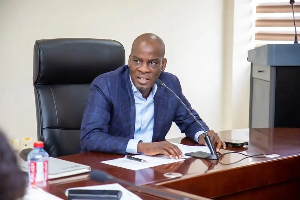Accra, Sept 21, GNA – Once a while I love to join public transport (Trotro) to enjoy the tick-chat, tick-chat, tick-chat that goes on among passengers.
Recently I joined a Trotro from Kwame Nkrumah circle to North Kaneshie, the usual gossips, shouts, argument over practically nothing started, and then suddenly I overheard an argument between a lady and gentleman as who can keep a secret; a Journalist or a Police
Officer.
As media practitioner, Trotro has sometimes served as information gathering centre for me, what am looking for determines the route I use, and the value of the gossips depends largely on the route.
Information you gather onboard Trotro from Circle to Madina through 37 Military Hospital, Airport, Legon Campus is different from what you gather onboard Tema Station Trotro to Teshie Nungua through Osu, La or Labadi, and Teshie.
What about Circle to Dansoman route, or Tema Station to Achimota, “I tell you in Trotro you see things, you smell things, you hear things and you are likely to touch some things”. You must also know the time and the season for boarding Trotro for good information.
Anyway back to the debate on: Whose ear will you whisper into? The two Trotro debaters have picked entrenched positions; the gentleman noted: “My sister, can you confidently whisper into the ears of a Police Officer that you know for a fact that your boyfriend
deals in narcotics, and be sure that he will not be arrested?
The lady retorted: “Yes that's easy just whisper into his ears and seal it with a stamp (money that's bribe). The colour (denomination) of the stamp is very important for the security of the
information provided.
“But for the Journalist, my brother, I will not dare, whether you give him or her a brown envelop or not, trust me so far as its newsworthy information you will see it the next minute in the news”.
As the argument developed I started reflecting over the issues raised and decided to talk to some few people on the topic.
Ms Cynthia Naa Aryee, a trader shouted: “eeeeh none of the above, they are all the same, they survive on information, so how on earth do you want me to whisper into their ears, never!
Mr Kofi Obeng Wiafe, a businessman noted: “I will whisper into the ears of the Journalist as I have learnt to live at hands length with a Police Officer.
You know what? A Policeman will always hide behind a colleague to act on your secret. It's very dangerous to whisper into the Policeman's ear.
A legal practitioner said: “I trust the Journalist more than the Police Officer. Even though some few Journalists have let me down, but overall, they have respected the confidence I have reposed in them”.
As I conjecture on the debate I realised that majority of Ghanaians are ignorant that both the Police and the Journalist perform effectively in the interest of the public based largely on whispering.
In an interview with the Ghana News Agency, a Senior Police Officer explained that the Police classified what you civilians called whisper as “Tip-off,” - a piece of confidential, advance, warning or hint, or inside information.
“We process whisper 'Tip-off' through security intelligence platform to review its sensitivity then act; to a security personnel knowledge is the only effective tool to prevail in the face of the wide range of asymmetric threats to national security,” he stated.
He revealed that the standard for intelligence gathering now is "need to share" not "need to know," which is sometimes gathered through wide range of platforms including the whispering platforms in town.
Intelligence is critical to ensuring national security, especially with asymmetric threats making up most of the new challenges. Knowledge, rather than power, is the only weapon that can prevail in a complex and uncertain environment awash with asymmetric threats, some known, many currently unknown in the public domain.
In their scheme of functions - the detection of crime; the apprehension of offenders; the maintenance of law and order; and the maintenance of internal peace and security the Police thrive mainly on information tip-off.
A senior Journalist on the other hand noted that media practitioners consider whisper as a lead - vital exclusive information with aspects of importance and excitement acquired by luck or initiative.
Similarly; a journalist cultivates information sources “lead” to collects and disseminates news about current events, people, trend, and issues.
Society is therefore endangered if citizens failed to feed the Police as well as the Journalist with vital information. They both seek the interest of the public but unfortunately due to the misdeeds of some few bad nuts among them a proportion of the general public are scared to venture information or whisper into their ears.
I concluded that based on the discussion; the two professional bodies are gradually losing the public trust-reliance on their integrity, ability, surety to the usage of protected information
passed on to them.
Opinions of Thursday, 22 September 2011
Columnist: Ameyibor, Francis
Whose ears, will you whisper into: Journalist or Policeman?
Entertainment













